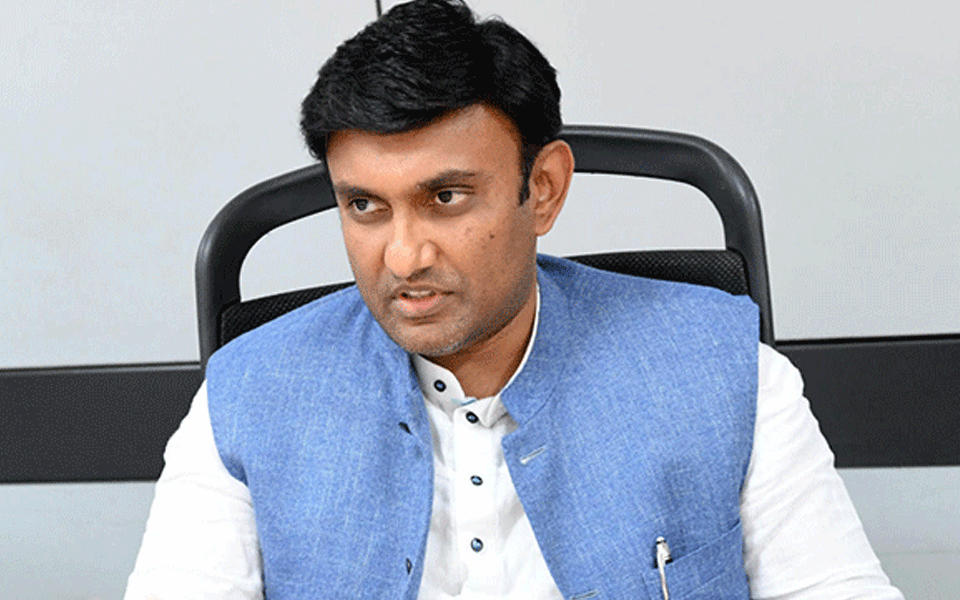Bengaluru (PTI): People entering Karnataka from neighbouring Kerala will have to remain in institutional quarantine for a week even if they are vaccinated and carry a negative RT-PCR test report, Karnataka Health Minister K Sudhakar said.
The measure is also applicable to air passengers from Kerala and they can choose a hotel of their choice, which had been designated for institutional quarantine.
Such travelers undergoing institutional quarantine will be tested on the sixth day and if the report comes out negative for COVID-19 on the seventh day, they will be allowed to go. "It has been decided in a meeting chaired by Chief Minister Basavaraj Bommai on Monday that travelers coming from Kerala, whether they have taken vaccines or have a negative RT-PCR test report, will have to compulsorily stay in institutional quarantine," Sudhakar told reporters here.
According to Sudhakar, the government is working out a strategy in consultation with experts on how to further strengthen COVID prevention drive in the districts bordering Kerala such as Dakshina Kannada, Udupi and Chamarajanagar. He also said the government may take "even more" stringent measures in the border districts to control the spread of COVID-19. The government has imposed stringent restrictions in view of increasing number of COVID cases in Kerala. Kerala on Monday reported 19,622 new positive cases and 132 COVID-19-related deaths, taking the caseload to 40,27,030 and the toll to 20,673. As the Karnataka government decided to restart from September 6 offline classes for students from class six to eight, Sudhakar said schools cannot be kept shut permanently and have to be reopened because children were lagging behind in their studies.
"For the past one-and-half years, our children have made slow progress in education. Education is important for the growth of children. It is the duty of the government to ensure academic future of the children," the Minister pointed out.
He added that all preparations have been made and guidelines have been made public on reopening of schools. "In case the positivity rate in certain areas goes beyond two per cent, the schools will be shut and everyone will be tested", the Minister said.
Asked if there will be COVID-19-related restrictions during the upcoming Ganesha festival, Sudhakar said the health department has been insisting that no public function should take place, because wherever people gather in large numbers, the threat of the spread of the pandemic increases.
Let the Truth be known. If you read VB and like VB, please be a VB Supporter and Help us deliver the Truth to one and all.
Panaji (PTI): As part of a crackdown against tourist establishments violating laws and safety norms in the aftermath of the Arpora fire tragedy, Goa authorities on Saturday sealed a renowned club at Vagator and revoked the fire department NOC of another club.
Cafe CO2 Goa, located on a cliff overlooking the Arabian Sea at Vagator beach in North Goa, was sealed. The move came two days after Goya Club, also in Vagator, was shut down for alleged violations of rules.
Elsewhere, campaigning for local body polls, AAP leader Arvind Kejriwal said the fire incident at Birch by Romeo Lane nightclub at Arpora, which claimed 25 lives on December 6, happened because the BJP government in the state was corrupt.
An inspection of Cafe CO2 Goa by a state government-appointed team revealed that the establishment, with a seating capacity of 250, did not possess a no-objection certificate (NOC) of the Fire and Emergency Services Department. The club, which sits atop Ozrant Cliff, also did not have structural stability, the team found.
The Fire and Emergency Services on Saturday also revoked the NOC issued to Diaz Pool Club and Bar at Anjuna as the fire extinguishers installed in the establishment were found to be inadequate, said divisional fire officer Shripad Gawas.
A notice was issued to Nitin Wadhwa, the partner of the club, he said in the order.
Campaigning at Chimbel village near Panaji in support of his party's Zilla Panchayat election candidate, Aam Aadmi Party leader Kejriwal said the nightclub fire at Arpora happened because of the "corruption of the Pramod Sawant-led state government."
"Why this fire incident happened? I read in the newspapers that the nightclub had no occupancy certificate, no building licence, no excise licence, no construction licence or trade licence. The entire club was illegal but still it was going on," he said.
"How could it go on? Couldn't Pramod Sawant or anyone else see it? I was told that hafta (bribe) was being paid," the former Delhi chief minister said.
A person can not work without bribing officials in the coastal state, Kejriwal said, alleging that officers, MLAs and even ministers are accepting bribes.





